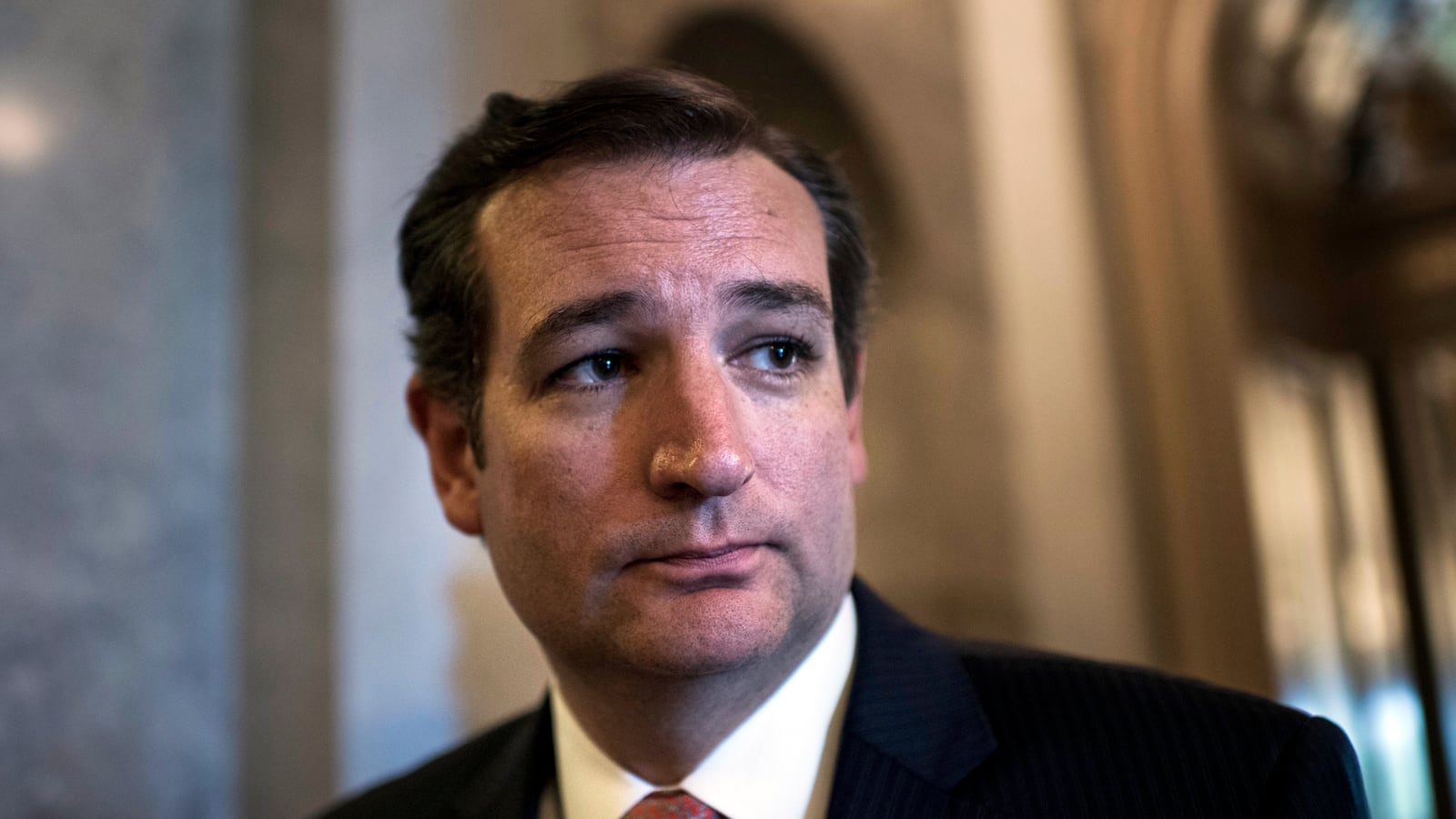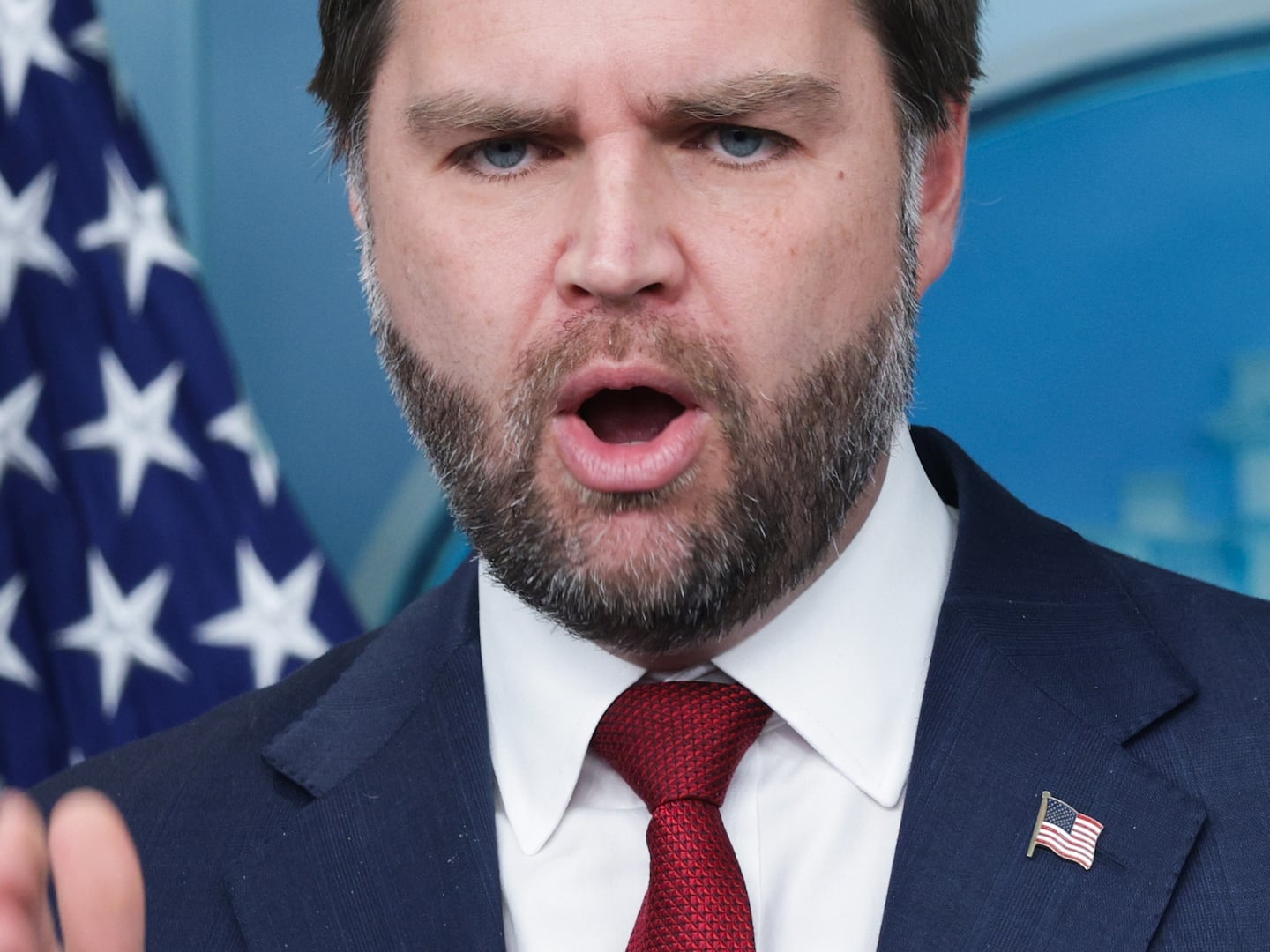Make no mistake about it: the on-going “extended speech” by Sen. Ted Cruz (R-TX) has absolutely nothing to do with defunding the Affordable Care Act—or even delaying it for one goddamn day.

As the long list of Senate Republicans who declined to back a full-blown, fill-your-hands-you-son-of-a-bitch filibuster over Obamacare could tell you, it’s a done deal that the president’s consistently unpopular health-care law is going forward even if the government shuts down. Come next week, the enrollment period is going to start, and come January 1, 2014, the plan will kick into gear despite every reason to believe it will be a clusterfudge of epic proportions.
So what exactly was Cruz doing up there, hogging the limelight on C-SPAN’s low-wattage webstream for a couple of hours, if he wasn’t serious about stopping Obamacare? He was playing his part in a pretty goddamned brilliant strategy to win the future not for himself but for the Republican Party.
Cruz and his fellow Sen. Rand Paul (R-KY) are the best-known of the gaggle of legislators that Sen. John McCain (R-AZ) denounced as “wacko birds” earlier this year. “It’s always the wacko birds on right and left that get the media megaphone,” sputtered McCain in the wake of Paul’s immensely popular and influential filibuster, which called much-needed attention to the Obama administration’s glib attitude toward civil liberties and executive branch overreach.
The wacko bird caucus overlaps pretty well with the Tea Party. Besides Cruz and Paul, it includes such characters as Sens. Mike Lee (R-UT) and Marco Rubio (R-FL) and Reps. Justin Amash (R-MI) and Thomas Massie (R-KY). Despite meaningful differences among them, they all support cutting federal spending and taxes, and reducing regulations on business and other economic activities. Unlike many members of the GOP, they are critical of the national surveillance state and, at least in the cases of Paul and Amash, are principled non-interventionists who are quick to question the Pentagon budget.
At a time when a record high 60 percent of all Americans agree the federal government has “too much power,” the wacko birds are flying pretty high, especially when they attack their own party for its utter malfeasance during the Bush years. There’s every reason to believe that the future belongs to the wacko birds and their general, transpartisan message that government is too big and too powerful. The trend throughout the 21st century, reports Gallup, is increasing skepticism toward Washington, D.C. The trend is particularly pronounced among all-important independent voters, who make up a plurality of the electorate. In 2003, 45 percent of them thought the government was too powerful. Now it’s 65 percent. They will vote for candidates—and a party—pushing limiting government.
But Cruz and Paul are speaking to significantly different audiences, despite being wacko birds of a feather. As befits the son of former Rep. Ron Paul (R-TX), who ran for president as a libertarian in 1988, Rand Paul is a consciously unconventional Republican who gained his Senate seat after beating Senate Majority Leader Mitch McConnell’s handpicked candidate in the 2012 Kentucky primary.
Paul is consciously going wide in looking for the sorts of newer, younger voters his septuagenarian father cultivated during the 2008 and 2012 presidential campaigns. At the Conservative Political Action Convention (CPAC) in March, he rapped the GOP hard for having grown “stale and moss-covered” and demanded the party “embrace liberty in both the economic and the personal sphere.” Almost alone among national Republican figures, he’s making serious attempts to win over black voters and woo millennials. One of his stump-speech lines stresses that Republicans “need to be white, we need to be brown, we need to be black, we need to be with tattoos, without tattoos, with ponytails, without ponytails, with beards, without.”
In contrast to Paul—and despite his suspiciously ethnic surname and scandalously Canadian birth—Cruz is the favorite son of an older, whiter America. As Paul brings in fresh new blood to a broad, limited-government coalition, Cruz is locking down the tired old blood that realizes the John Boehners, Mitch McConnells, John McCains, and Lindsey Grahams of the world really don’t give a rat’s ass about them. Almost without exception, Cruz’s positions, including his “Potemkin battle” to stop Obamacare, mesh perfectly with what Slate’s David Weigel calls “Republican seats that are largely whiter and more rural than the rest of the country.”
Where Paul wears turtlenecks, sports weird hair, and talks about letting states decide their own laws on drugs and marriage, Cruz is rocking a retrograde, wet-look haircut and is unambiguously and unambivalently conservative on any social issue, including the phantom menace of Sharia law (“an enormous problem” in America, according to Cruz). You’d think Cruz’s Ivy League bona fides—undergrad at Princeton, law school at Harvard—would hurt his street cred with disgruntled flyover-country independents and Republicans, but he’s playing it perfectly. His diplomas certify that’s he’s just as “whip-smart” as President Obama even as he can testify from personal experience that Harvard Law is housing a dozen “Marxists who believed in the Communists overthrowing the United States government.”
Indeed, Cruz’s greatest political asset is the disgust he inspires in mainstream liberals. Every jab by Beltway Draco Malfoys such as The Washington Post’s Dana Milbank (who sniffs that Cruz is “an opportunist driven more by ambition than ideology”) and get-a-load-of-this eye-rolling by coastal elitists (Cruz was “creepy” as an undergrad and strolled around Princeton in a “paisley bathrobe”) make him more effective with his core audience. GQ readers may think Jason Zengerle’s well-wrought hatchet job has shown all the world what a pompous, humble-bragging jackass Cruz really is: he can’t stop namedropping! He’s got a self-aggrandizing portrait of himself in his Senate office! He insulted the venerable Sen. Dianne Feinstein! The “maverick” John McCain “fucking hates” him! But the GQ piece, like all liberal criticism of Cruz, and even vaguely contentious interviews with semi-conservative types such as Chris Wallace of Fox News, makes him a bigger hero to his fans.
The odds are that neither Paul nor Cruz will be president. It’s nothing against them; it’s just that the odds are stacked against any individual. But commentators who think these guys are in politics only for themselves are missing the energy that’s driving the wacko birds. Maybe, just maybe, they really do believe in shrinking the size, scope, and spending of the federal government. And maybe they realize that their vehicle of choice, the Republican Party, really does need to reach out to new swaths of the electorate while holding on to conservatives.
If that’s true, then between Paul and Cruz, they’re covering a lot of territory. For my money, the most interesting moment in Cruz’s interminable speech came when Paul, who refused to back a filibuster on defunding Obamacare, popped in to ask a question. It was like an old Chip and Dale routine from Looney Tunes, where the two excruciating chipmunks couldn’t stop complimenting each other. Would Cruz, Paul asked, ever compromise and vote for a budget that included funding for the Affordable Care Act?
Before getting to a long-winded, circuitous, and utterly predictable no, Cruz took a few minutes to talk about how Paul’s filibuster in March of CIA Director John Brennan’s nomination was historic and momentous. Cruz noted that the filibuster was the first time he ever spoke on the Senate floor and that it was among “the proudest moments of my life.”
Part of that is surely just the sort of flattery for which the Senate is nauseatingly well-known. But there’s no question that these two wacko birds, and the others in that small and growing nest, are pulling in the same direction even as they are courting different audiences. They’ve shown that they can work together, and they’ve shown that they’re not standard-issue Republicans but true believers in limited government. In a country where six of 10 voters already think the government is too big, the wacko bird caucus has got a lot of room to fly.






